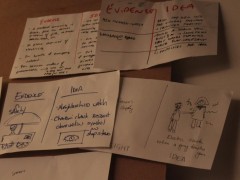Unboxing human experiences

Unbox festival is a 4 day design and arts festival held in Delhi. The festival is unlike any other, with its open collaborative spaces and its emphasis on ‘hands on’ acts of creation. With participation of practitioners from across various disciplines and geographies, it is a fertile ground for practical new ideas and solutions.
My first workshop at the Unbox festival was with ‘Final Mile’, a ‘behavior architecture’ firm. It uses insights from cognitive neuroscience and behavioral economics to nudge human decisions, experiences and preferences. As an advertising professional, this was an important skills set for me to sharpen – not only to strategize for change, but to also be conscious of the effects of the changes we engineer and inform the decisions we make about ‘right or agreeable’ changes.
It turns out that most of our decisions are intuitive, emotional and arrived at through ‘short cuts’ (for which experts have a needlessly complicated word – ‘heuristics’). And as such it turns out that our decisions are also quite malleable. The power of suggestion is being harnessed through newer and newer forms to persuade you to buy more, act in a certain way, think in a certain manner and so on. With the FinalMile workshop and PAN studios presentation, I got a glimpse into the future of our mediated minds. I felt as if the future ‘doors of our perception’ would be ‘wider’ and accessible to others.
The right nudges 1
Here’s one of the examples from the FinalMile workshop. Everyday about 10 people die in Mumbai trying to cross railway tracks. That is an astounding tragedy – one that arouses such questions in us as ‘why not build stronger barriers’, ‘what do the track crosses think? are they idiots?’, ‘aren’t they warned? Aren’t they scared?’ and so on.
It turns out that our brain is wired to make a few mistakes – in this case a fatal one. Habitual track crossers start feeling that ‘I am a railtrack crossing expert’. Yet we aren’t very good when it comes to assessing the speed of large moving objects, and we tend to be overconfident about our abilities. All these flaws converge on the railway tracks in a fatal situation.
Simple information or warnings would not bring about any change in the behavior of track crossers. After all, one can read about danger, one can see danger, but one won’t necessarily act unless one actually feels danger. Hence it is important that the authority designs the experience of railtrack crossing in a way that gives track crossers that certain feeling of danger well before the train arrives to allow them enough time to act.
So FinalMile designed the experience with these points in mind. They requested the authorities to blow the incoming train’s horn in a staccato fashion – apparently a staccato horn is more effective as a warning that a single tone horn. They created reference points on the tracks with varyingly placed white lines on tracks to help track crossers assess the speed of the oncoming train. The horn was to be blown 7 seconds before the train arrived at a place where people usually cross the track – that’s the optimum warning time. These measures helped reduce fatalities by 30% to 70%.
The right nudges 2
The Bespoke Project by students of NID (National Institute of Design) created a wonderful interactive tool that answered a real need. Women’s safety is a relevant social issue that is generating a lot of positive debates, projects and initiatives in the National Capital Region of India. “Share the Stare”, a project born out of the Bespoke project at Unbox tried to address the immediate issue of efficient distress signals sent out by a person in danger. They utilized the traditional bird feeding contraptions often seen in the communal areas of old Delhi. The idea was to utilize the space in a new way – turning it into a twitter broadcast service for broadcasting distress and raising alarm. A person in danger can send a sms to a given number. Upon reception, a local ‘share the stare’ contraption starts making a noise and attracting attention while also simultaneously sending out a distress signal through Twitter to people in the locality.
A project conceived and prototyped within 3 days of festival by design students has the potential to evolve rapidly into something that will be robust and really useful in real life scenarios.
Tags: behavioral science, bespoke, collaboration, creativity, culture, death, decisions, design, india, railways, unbox, Unbox festival, women safety

